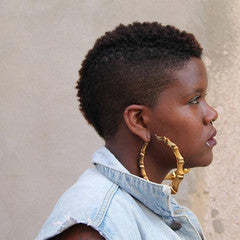“The Refutation of Good Hair” with Nakeya B

Interview By Lissa Alicia
Nakeya B is a mother and photographer currently based in New York & New Jersey. In her work, Nakeya explores the many dimensions of African-American hair through the use of different styles, products, and tools - such as hair rollers, kanekalon, and pots full of boiling water. The carefully selected props paired with the delicate and feminine color palette enables viewers to witness the marvelous and sometime strenuous relationship that black women have with their hair. In this interview Nakeya speaks on her photography, black hair in the media, and how both motherhood and going natural motivated her to capture African-American hair in her work.
How did you begin your journey as a photographer?
A photo class in high school many, many moons ago. Upon graduating I was gifted with a camera and have been documenting the experiences of others and more recently my own ever since.
What prompted you to explore the past and present of black hair in your work?
Going natural and motherhood sparked a visceral period of self-reflection where I recounted my experiences with my own hair. This triggered a new trajectory in my work and I started to visualize my past memories and understandings of beauty and blackness. As I made more work, I developed a fondness for exploring America's consumption and imagining of the African American female figure, when blackness implanted itself into the notion of glamour and beauty, and the processes for finding a space in both concepts. To create that contemporary dialogue, one has to look to our history.
Why was it important for you to explore the subject of black hair in your work.
To be a black woman is to be many things, one of which, is a perplexing collection of notions. Black hair is interwoven in that complex web and I have a genuine curiosity for it. I am concerned with using my work as a tool to deconstruct the negative notions, adverse attitudes, and mystery surrounding black hair.

If you don’t mind disclosing, has your relationship with you hair changed since you began working on black hair projects in your photography.
My relationship with my hair changed most when I chopped it all off. Centering my work on black hair has changed my relationship with my audience. It’s created a sense of solidarity amongst us all.
For all of the naturalistas who may be reading, what is your hair type, and hair care regimen
5 out of 7 days of the week I am wearing my hair in a tightly curled, finger-combed afro. I do nightly two strands twists as much as I can and moisturize daily. Recently I’ve started cold water conditioning as opposed to warm water washing.

I am sure you are familiar with natural hair bloggers like Hey Fran Hey, Naptural85, and Urban Bush Babes. Personally they made the beginning stages of my return to natural journey much easier. In some ways I kind of feel like they were pioneers. Some time after, I began witnessing more WOC (women of color) rocking their afro puffs and twist outs in mainstream media (ie. Solange). Although more women were showing off their true roots I felt like my 4c hair type was not represented in the magazines. Do you think that mainstream media is biased when it comes to showcasing all types of kinky hair including 3c-4d?
Of course. The print and broadcast industries have a very specific “look” they are going for when it comes to presenting women of color in their productions. It’s no secret that the pro-type for the spot is a racially ambiguous woman. Hair type and skin tone are racial signifiers, so they dictate what makes the cut. I’ve witnessed the radicalized castings in my own line of work and in mainstream culture.

I can totally relate to “If Nostalgia Was Colored Brown” and “The Refutation of Good Hair” - my childhood was full of kanekalon, foam rollers, satin bonnets and pink lotion so I’m kinda obsessed with your series. What other topics have you explored with your work, because I am sure myself and many other art lovers would be interested in seeing more?
There’s the series Hair Stories Untold which explores the act and process of hair care and maintenance. It’s a collection of rituals undertaken within the realm of beautification amongst black women. Revealed within this project are sacred and private moments of self-grooming.
What's your astrological sign and are you true to its traits?
Taurus. I’m a very determined individual, so in a sense, yes.
In what ways do you challenge stereotypes in your daily life and work as well.
Making self-affirming work and constructing representational imagery to communicate that black feminine stories deserve attention.
I can definitely appreciate that your Instagram stays true to the pastel color palette that you use in your photo series. Why did you choose such a soft and feminine aesthetic to use in your work?
I love its delicacy. The softer colors compliment the tone of my voice and work as an artist, both of which are subtle.
What projects are you currently working on?
Concepting my next body of work entitled, "The All-American Hair Pair".
For more information on Nakeya B and her work please visit her Website, Instagram, or Facebook.
 |
Melissa "Lissa Alicia" Simpson is a 23-year-old freelance journalist, media & marketing specialist, event curator and amateur model. Her interests include binge watching Dr. Who, writing creative nonfiction and street art. Find out more about Lissa at lissalicia.com. |

